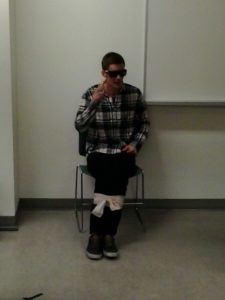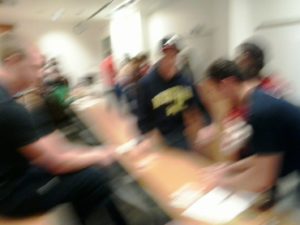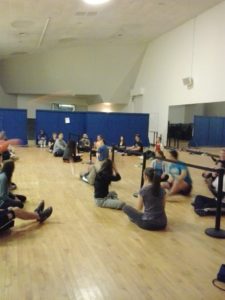
Furthermore, his sight has been impaired.
Additionally, the bandages will impair his ability to stand and walk simulating such concepts as arthritis and muscular fatigue. Attribution-NonCommercial-NoDerivatives 4.0 International
The simulation experiences are designed to simulate changes in both physical and sensory systems that occur as a result of the aging process or as result of a disease, disorder, or injury. When navigating the environment as an able-bodied individual the obstacles that others who are not as fortunate remain invisible. When forced to play a sport, participate in a physical activity, or complete an activity of daily living when one or more of your abilities is removed can be taxing and frustrating. These labs are created so that you can gain a better understanding and alternative perspective of the individuals studied throughout the course. The aim is to promote greater appreciation for the challenges other individuals must overcome to perform the same tasks that you may complete on a daily basis.

Student Comments regarding simulation experiences:
“The simulation labs provided opportunity for us to get out of a classroom setting and partake in activities of daily living in which are a struggle for the older population. This hand-on activity opened my eyes to understand the process of aging and how difficult some activities are for the aging population.” ~ Kaylie Gilhuly
“Her lectures are very enjoyable as she facilitates your learning through a variety of different techniques. For example, Dr. van Wyk ran a variety of simulation labs for both her Movement and Aging and her Special Population courses. These were designed to offer perspective into a variety of different populations and what deficits they had to deal with and how it affected their daily lives. These experiences helped to further explain the material she is teaching, and really benefited her courses as a whole.” ~ Matthew Harrigan
“Professor van Wyk was constantly coming up with new innovative ideas to facilitate our learning outside the standard style of lecturing. For a portion of each of our classes she incorporated a sensory stimulation lab as part of our overall grade. It was one of the most fun and interesting learning experiences I have had thus far in my three years of University. We got to experience firsthand how it feels to have a physical impairment, while applying our knowledge to hands-on situations.” ~ Meghan Gaudette
“She often made a point to actively involve her students in the learning process by asking questions and designing games and simulation activities that were fun, yet supported and expanded upon the material that was being taught. The overall classroom experience created by Dr. van Wyk was both effective and enjoyable.” ~ David Bingeman
“It was a great and clever idea for you to make use experience the real thing instead of just imagining how it’s really like.” ~ Kristine Silva
